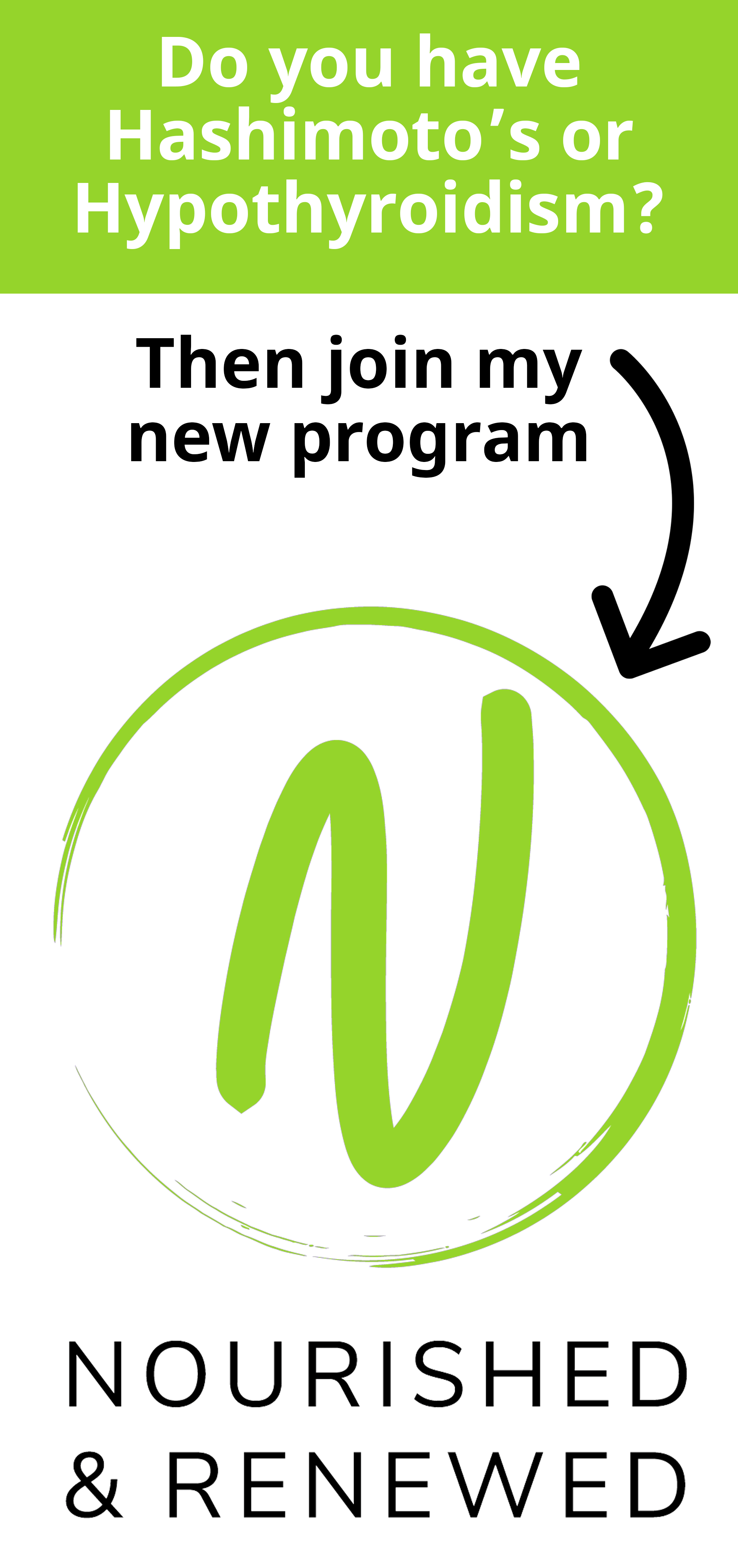Unless you’ve been living under a rock, you’ve probably been told by a family member, friend, doctor or even the local coffee shop barista that you should be taking fish oil supplements. Everyone's an expert on fish oil these days.
But what’s so special about fish oil?
Would everyone really benefit from it or could it be a fad?
Is fish oil in supplement form safe to take if you have Hashimoto’s Disease?
And the most important question: Is it right for you?
Fish oil is understandably confusing, especially when the term is used interchangeably with omega-3s and initials like DHA and EPA.
So, if you’ve ever thought this whole fish oil thing was… well, fishy, (sorry, had to do it,) you’ve come to the right place.

Why You May Need Fish Oil Even Though Your Ancestors Didn’t
For almost as long as humans have existed, we have lived near watershed areas: oceans, bays, springs, rivers, etc. This made sense because humans, like all animals, need water to survive.
Water means life. We drink it, we wash in it, we get food from it.
But as technology evolved (especially these past 120 years), humans have had the luxury to move away from water. (Many of us are still drawn to it for its beauty and comfort but that’s beside the point in this case.) We invented ways to get what we needed from the water without necessarily living in close proximity to it.
We now have plenty of ways to transport water to anywhere in the world that we may live. Foods from the water can be delivered many, many miles (that is another issue altogether) but fresh, cold-water, fatty fish can be pretty expensive in its freshest forms.
Suddenly, as more humans moved away from watershed areas, foods that had been consumed by generations of humans were becoming less regular in the diet, and in many cases, not necessarily a “health food” any more.

Why is Seafood Less Healthy Today?
One of the biggest concerns among watershed foods is the pollution from heavy metals that are released into the air (from burning coal, mining, refining oil and much
more) and into the water (farming, fisheries and ranching runoff). Even the heavy metals in the air eventually end up in the water too.
One of the biggest heavy metals of concern is mercury. While the amount of mercury found in fish is small, it builds up in fish and in humans over time. Mercury is especially concerning among the larger species of fish - and the human body has a hard time flushing it out of our systems.
Long-term build-up of mercury can directly affect the brain, causing memory issues, anxiety, depression, autism, Alzheimer’s, Parkinson’s and decreased dexterity and fine motor skills. High mercury levels in pregnant women can also impact brain development of the fetus.
Pregnant women are generally most aware of mercury consumption, as certain fish are on the list of foods to avoid due to possible toxicity.
But this doesn’t mean fish is off the table, so to speak.
As a matter of fact, it should still be a part of a healthy diet. There are steps you can take to ensure you are getting a safe amount of type of fish that will allow you to reap the benefits but avoid toxicity.
But first, let’s delve into what those benefits are exactly.

Fish Oil for Heart and Brain
Undoubtedly, benefits for brain and heart health are the most well-known reasons to take fish oil.
The shelves at Costco are lined with super-sized supplement bottles for cheap, but do most people even know what to look for in their fish oil supplement?
Breaking Down the Science Behind Fish Oil and Omega-3s
First, it’s important to understand what KIND of fat is in fish.
Fats, or fatty acids, are categorized by if they are saturated or unsaturated. Saturated fats, which tend to come from non-fish animals, have only single bonds in their fatty acid chain. These fats are solid at room temperature (butter, lard, coconut oil, ghee).
Unsaturated fats, mostly from fish and plants, have at least one double-bond in their chain and tend to be liquid at room temperature.
Those with more than one double bond are called polyunsaturated fats. This is the group omega-3s are a part of.
The term omega-3 refers to where in the fatty acid chain the first double bond is. (For any science nerds like me out there, it’s the third bond from the omega end.)
Other unsaturated fats include omega-6, omega-9 and omega-7. It is very important to note that most fats and oils have some combination of types of fatty acids but have a majority fat type, like omega-3s in fish oil.

The Essential Omega-3
With so many fats out there, it’s important to know the two main reasons why there is so much focus on omega-3 fatty acids (the kind found almost mostly in fish).
The first reason is the importance and evolution of our fat ratios over the generations. Our ancestors, like us, got their fats from a variety of sources, including both omega-3s and omega-6s. But unlike us, our ancestors ate in a way that their ratio of omega-6s to omega-3s was about 1:1 or even, depending on where they lived, 1:2.
But now, with the Standard American Diet, (there’s a reason the acronym is SAD,) we get more like 15:1. This is easily understood when you look at the sources of omega-6s: safflower, corn, soy, cotton and sunflower oils.
These types of oils are highly processed oils, and go through numerous steps in manufacturing before hitting the grocer’s shelves. Omega-6 oils can be hydrogenated or partially hydrogenated, allowing foods to be shelf-stable for long periods of time, and therefore are pretty cheap to make and sell, but their existence and over-consumption of them are completely changing our omega ratio. This wouldn’t sound like such a problem until you consider that omega-6s are generally considered to be pro-inflammatory.
If you have been following my blog posts for some time, you know that inflammation is the name of the game when it comes to the development of autoimmune diseases, and getting it under control is the antidote.
So, the second reason omega-3 fatty acids are essential is because they are literally essential. Essential fats are ones that our bodies can’t make.
We have this beautiful ability to convert fats into ones that we need but there are some that we can’t create. This includes omega-3s… sort of.
If you weren’t confused enough by all the omega talk, there are actually three different kinds of omega-3 fats: alpha-linolenic acid (ALA), eicosapentaenoic acid (EPA), and docosahexaenoic acid (DHA).
We cannot make ALA and must get it from food. If we do get it from food, we can convert ALA into DHA and EPA. But not very well.
At best, 10-20% of ALA is converted to EPA and DHA. And competing with the conversion? Omega-6 fatty acids. (Oh jeez, not these guys again!)

The Nitty Gritty of Fish Oil Benefits
Now that you know why getting omega-3 fatty acids from fish oil is important, let’s make sure you understand exactly what they do for your body.
DHA is critical for brain function. In fact, 9-12% of our brain’s weight is made up of DHA. It is known to support cognitive function and brain development, as well as photoreceptor membranes of the eye.
I am a big fan of supplementing omega-3 fatty acids for children with ADHD-like symptoms.
Why? Some research shows that ADHD and omega-3 deficiency share some common symptoms.
DHA also activates hormone receptors and has been found to reduce the risk of heart attacks and strokes.
EPA is especially anti-inflammatory, as well as lowering triglyceride levels and preventing calcium buildup in blood vessels.
Both DHA and EPA are great at battling inflammation and boosting mood.
Omega-3s for Hypothyroidism and Hashimoto’s
The next big question, of course, is if these fats are helpful for people with thyroid disorders like hypothyroidism and Hashimoto’s disease.
As you can imagine after learning of all the benefits of omega-3 fatty acids, the short answer is yes.
Because of their role in fighting off inflammation, omega-3-containing fish oil can help prevent flare-ups and leaky gut. It’s also good for supporting immune function and for battling depression caused by Hashimoto’s.
And good news: there are no known interactions between fish oil and hypothyroidism medications like levothyroxine (Synthroid).

When Not to Take Fish Oil
Fish oil has naturally blood-thinning properties so it is not recommended for anyone currently taking an anticoagulant or blood-thinners such as warfarin.
Also, talk to your doctor before taking fish oil if you are taking blood pressure medication, estrogen-based birth control or the weight-loss drug Orlistat.
How and When to Take Your Fish Oil
If you decide that you could benefit from supplementing with fish oil, a healthy dosage is 1,000 mg. This amount of fish oil will usually supply 300 mg of combined DHA and EPA. Taking 500 mg is also considered safe and anyone with a history of coronary heart disease may take up to 1,000 mg (combined DHA and EPA).
And it is important, as we’ve learned, to take a fish oil that includes both DHA and EPA.
While fish oil is food-based and therefore not required to be taken along with food, many people choose to take it with food to prevent experiencing a fishy taste or burps. Some people also experience an upset stomach if it’s not taken with food.
Vegetarian and Vegan Alternatives to Fish Oil
Where are my vegetarians and vegans at?
I know you are wondering what your options are and it’s a valid question.
For those who need an alternative to fish oil, there are omega-3 supplements that are algae-based that supply both DHA and EPA, albeit in often lower dosages and with a bigger price tag.
Some vegetarians and vegans choose to use ALA as their omega-3 source. Just keep in mind the ALA to DHA and EPA conversion restrictions.

Quality Products are Key to Quality Health
There are many sources for fish oil these days, and while that’s a good thing, it means we have to be extra mindful of quality.
Look for fish oil supplements that indicate the fish source is clean of heavy metals. These can include IVO certification or a Purity Award by the Clean Label Project.
Choosing Fish, Not Fish Oil?
Maybe you’ve decided that fish is more your thing than fish oil. I get it: I am a huge advocate for “Food First.”
Keep in mind two things:
- it is absolutely safe to supplement with fish oil and also include fish in your diet
- to get enough omega-3s, you have to eat a lot of fish, which may expose you to too much mercury
I am a big fan of fish and love to include high-quality fatty fish into my and my family’s meals. With that in mind, be mindful of the sources, especially if you eat it more than once or twice per week.
Smaller fish have less toxins and heavy metals than larger fish. (This makes sense when you think about the fact that larger fish not only get toxins from the water itself but also from the smaller fish they eat.)

These fish have the highest omega-3 fatty acid content:
- Mackerel
- Salmon
- Herring
- Sable
And these are the fish found to be highest in mercury:
- Shark
- Swordfish
- Orange roughy
- Gemfish
- Barramundi
- Ling
- Bluefin tuna
(Bluefin tuna, swordfish and barramundi are also high in omega-3s but kept them off the list for their mercury content.)
If you’ve needed an excuse to take fish oil, to eat fish weekly or both, you now have that excuse. Omega-3s are an important part of the human diet, even if we don’t always live seaside anymore.

More Thyroid Support is Available
If you would like more support with your thyroid health and overall wellbeing, plus finding out which supplements might be helpful for Hashimoto’s, you can check out my 30-day Nourished & Renewed With Hashimoto’s program.
This is a self-paced online lifestyle program that offers tangible, realistic solutions for improving your Hashimoto’s and your overall health in a way that lasts.
If you are looking for personalized attention to your thyroid, seek out a program and thyroid advocate who can give you the tools and resources to feel your best again.
I would recommend my Happy & Healthy Adult Program for those with possible thyroid health issues.
Working closely together, we can customize a supplement and meal plan regimen just for you.
Click on the info-graphic below to see my generic recommendations for fish oil supplements.






